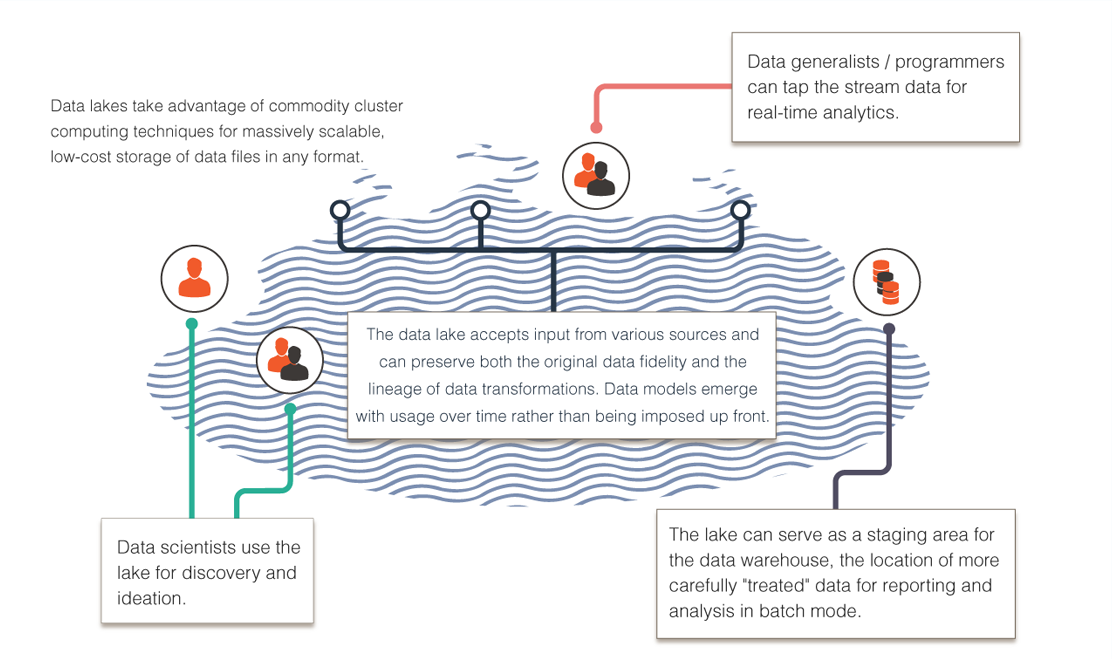A case for BI On Cloud - Data Warehouse Migration to Cloud :

Data Lake
The case for Analytics and Business Intelligence (BI) on Cloud is very compelling for following key reasons;
- BI on Cloud is faster and easier to implement.
- BI on Cloud has lot more to offer on hardware and software
- BI on Cloud is much more affordable compared to traditional BI.
It is no surprise that many data focused organizations, small and large enterprises have started to migrate their BI system from On-Premise Data Center to a Cloud or Hybrid BI solution. Although it is not expected that customers will rapidly replace their on premise BI solutions in favor of Cloud immediately, but it is observed that there are lots of, legitimate Analytics use cases where the Cloud BI model would be beneficial and worth consideration. For the clients who are in Cloud and On-prem we see a strong pattern in they moving their Analytics and Marketing data to Cloud and keeping Financial Reporting to their existing On-Premise BI for time being.
Based on the industry shift toward Cloud we see strong indications for customers to accelerate their BI migration to Cloud in 2016 and further, this trend is helped in part by big vendors enabling their traditional BI solutions as a Cloud offering in an attempt to capture more of the mid-size market. Vendors are expected to further strengthen their Cloud BI offerings and refine the migration approach to promote better adoption.
Business use cases for BI and Analytics on Cloud
There are several operational and financial factors that work in favor of Cloud Business Intelligence (BI),
The key being:
- Speed of Implementation and Deployment: Immediate availability of environment without any
dependence on the long periods associated with infrastructure procurement, application deployment,
etc. drastically reduces the BI implementation time window.
- Elasticity: Leverage the massive computing power available on the Web, scale up and scale down
based on changing requirements.
- Focus on Core Strength: Outsource running of BI apps and focus on their core capabilities.
- Lower Total Cost of Ownership: Convert some part of capital expenditure (capex) to operational
expenditure (opex), cost-effective pricing models, pay per use model, etc.
- On-demand Availability: Support mobile and remote users, Browser-based access to control everything from the Cloud platform to database management, from the data warehouse layer to the analytics platform.
Business concerns for BI and Analytics on Cloud
There are also many inhibitors that has been cause for the adaption of Cloud on BI so far. A few
common and leading concerns are mentioned here, along with recommendations on addressing the
concerns:
- Data Security: Security concerns including confidentiality, integrity and availability of the data
continues as the top concern for utilizing the Cloud. For some organizations, the concerns over
security may be a barrier that is impossible to overcome today. However, as more organizations move
to the Cloud it is expected that the concerns will lessen. In many cases, the Cloud vendors provide a
more secure environment than what exists at customer sites. It is important to note in In 2013 CIA moved some of their data center to AWS Cloud. http://fortune.com/2015/06/29/intelligence-community-loves-its-new-amazon-Cloud/
- On premise Integration: Sudden movement to Cloud is not feasible and a phased approach is usually
recommended. There will be a co-existence model until the Cloud BI market is more mature.
- Lack of control: Tough to get Service Level Agreements (SLAs) from Cloud providers. Data control and
data ownership, reliability of service challenges are some of the main reasons for client concern. To
mitigate this, organizations should already have in place thorough IT governance and service delivery
standards and models.
- Vendor Maturity: Too many Cloud BI vendors, hosting providers with varying offerings, etc. makes it
confusing to choose the right vendor based on required needs and vendor capabilities.
- Performance: Limits to the size and performance of data warehouses in the Cloud, significant latency if
BI applications exist in the Cloud but the data exists at a client site, especially when processing and
returning large amounts of data.
- Pricing models: Lack of standardized pricing models makes it difficult for customers to select the right
one
Agile Intelligent Solutions and Services can help you build a Cloud based BI and Analytics solutions that is scalable, secure, cost effective and very functional.
There are many Cloud Companies to choose from such as Amazon , Google or Azure Cloud. Amazon Web Services (AWS) has BI & Big Data solutions such as S3 , RDS, Redshift, EC2, EMR for Hadoop , Spark, Presto, Splunk offering compute, storage, database, analytics, application, and deployment services for your BI, Analytics and Big Data solutions. Similarly Google has their Big Query and Microsoft has their Data Lake solution. We have implemented these solutions at our client locations and have seen them working to significantly lower cost, move quicker, and scale build highly scalable applications.
So if you’re an organization looking for a simple yet cost-effective data warehouse solution then you should certainly consider some of these Cloud BI solutions. For example AWS Redshift will analyze all your data using your existing business intelligence tools. You can start for as little as $0.25 per hour with no commitment. Customers have happily reported a savings of up to $333.00 per uncompressed terabyte per year.
The Author is Raj Babu Sr. Solutions Architect & CEO of a Cloud Bi & Analytics company Agile iSS
Reference material used – www.AgileiSS.com
